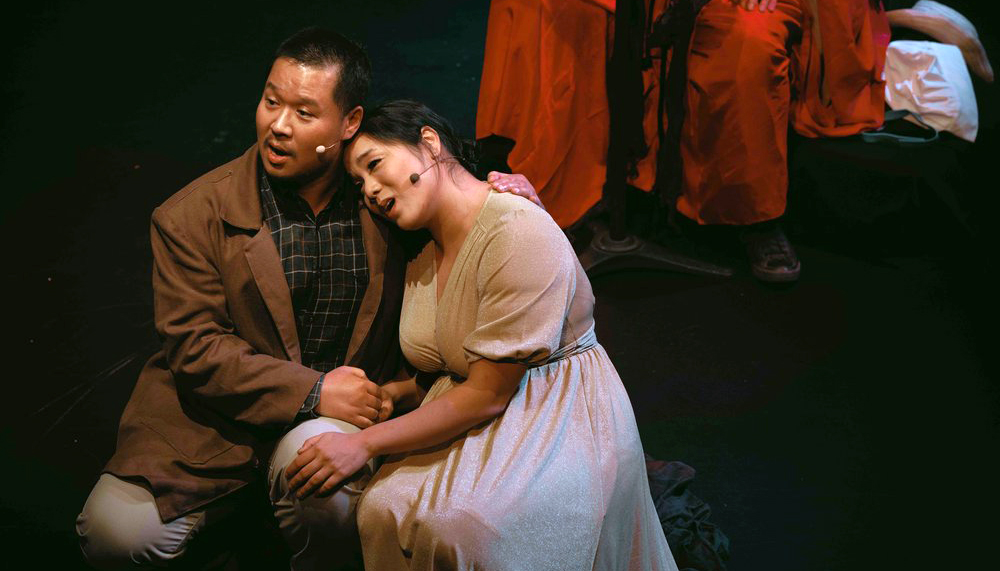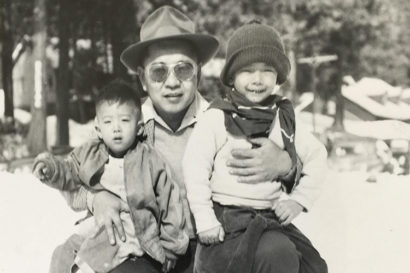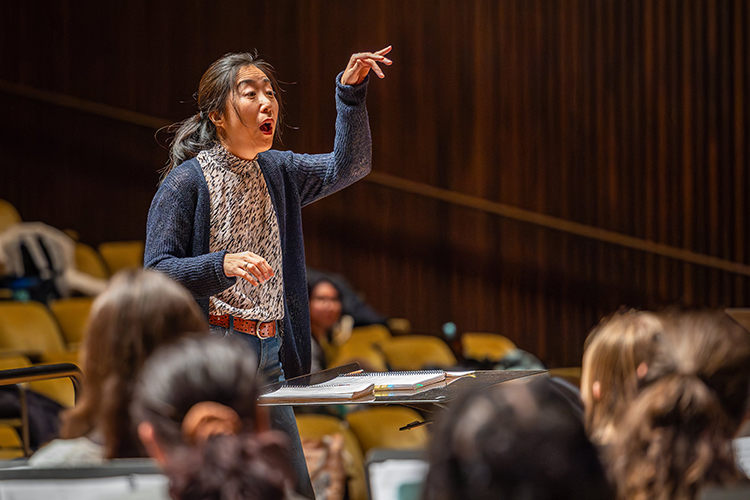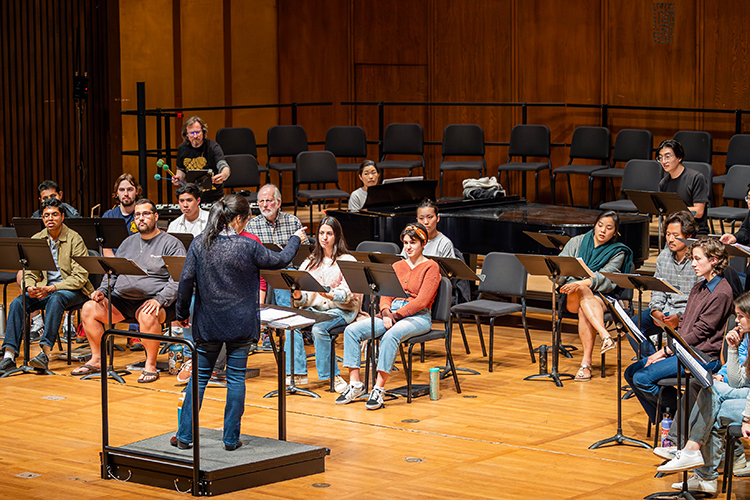For 50 years, he’s written about the Japanese American internment. Now, he’s turning to opera.
UC Berkeley professor and playwright Philip Kan Gotanda tells the story of a young Japanese American farmer who loses everything in Both Eyes Open, to be performed on campus Feb. 15 and 16.

Carlos Castenada Jr.
February 10, 2025
It was exhilarating to sit so close to an opera star. Tenor John Duykers was performing the lead in the chamber opera, Mordrake, and playwright Philip Kan Gotanda could practically feel the singer’s breath on his face. It was 2009, and the audience sat enraptured in a small studio space tucked away in downtown San Francisco.
“It knocked my socks off,” said Gotanda, a UC Berkeley professor of theater, dance and performance studies. “He was just 10 feet away from me, slaying me with his magnificent voice. I was amazed at how he transformed the atmosphere and the whole environment around him.”

Courtesy of Philip Kan Gotanda, copyright Diane Takei 2021
Although Gotanda was an experienced playwright — he’d written dozens of plays, and even a few musicals, about the Japanese American experience — he’d never tried to produce an opera. So after the performance, he walked up to Duykers and told him, “I want to work with you.” Duykers agreed.
Duykers went on to introduce Gotanda to his son Max, a Brooklyn-based composer, and over the course of a decade, the younger Duykers and Gotanda created Both Eyes Open, an experimental electroacoustic opera that tells the story of Japanese American incarceration during World War II. The opera made its world premiere in 2022 at San Francisco’s Presidio Theatre and its New York premiere at the Flea Theater in 2023. (John Duykers performed the role of a monk in both performances.) Now, the opera is making its campus debut in Berkeley’s Zellerbach Playhouse on Feb. 15 and 16.
For Gotanda, who has written about Japanese American history for 50 years, working on new music opera is “like a whole new world that I didn’t know existed or could imagine myself being a part of,” he said. “It’s so nice, as an artist, to find yourself in an environment that makes you feel young and fresh.”
It’s part of the land
Both Eyes Open begins with a young Japanese American man, Jinzo, walking toward railroad tracks. We see him lie down on them and wait. When a train comes, the stage goes dark.
The haunting moment is based on a graphic photograph that Gotanda came across during his research on the Japanese American internment, when 120,000 Japanese Americans were imprisoned by the U.S. government after Japan attacked Pearl Harbor in 1941. “It so struck me that a young man would do this,” said Gotanda. “That became the starting point for the story.”
The opera then telescopes back to track Jinzo’s journey, and we learn what drove him to suicide. A farmer in California’s San Joaquin Valley in the 1930s, Jinzo grows tomatoes, asparagus and other vegetables “from fertile soil, believing in the American dream,” said Gotanda. When WWII breaks out, he’s incarcerated in Rohwer, Arkansas, with his wife, Catherine. While in the camp, Catherine dies during childbirth; when Jinzo returns home after the war, he finds out that his farm now belongs to someone else. “He has lost everything,” said Gotanda.

Courtesy of Philip Kan Gotanda, copyright Diane Takei 2021
The story of Both Eyes Open is a personal one for Gotanda. Like most people of Japanese ancestry living in the U.S. during the war, his parents were rounded up and incarcerated, only to be released three years later with nothing. Like Jinzo, they were sent to live in abysmal conditions in Rohwer, Arkansas, and returned to Stockton, California, to build a new life in a country that had betrayed them.
Although they lived in a thriving Japanese American community, where his dad worked as a respected physician, Gotanda could sense something wasn’t right — something his parents wouldn’t talk about, but hinted at. He didn’t know why, until he got older and learned more about the internment and the intergenerational trauma that stems from it.
“I wasn’t aware until later about how much racism they were encountering, anti-Japanese sentiment, hate, because of the war,” he said.
Gotanda went on to write more than 40 plays that explore a range of themes about the Japanese American experience, including the racism his parents experienced and that he had internalized growing up.
“You may not even know it’s there, but it is literally part of the land,” he said. “It comes up from the land and infects your body, and it weakens you because it makes you, in some way, buy into the racism.”
‘Going forward, what will it grow?‘
When the opportunity arose for Berkeley’s Chamber Chorus to become a part of the campus production of Both Eyes Open, Wei Cheng, who directs the campus’s Choral Program, couldn’t pass it up. “I’m always looking for collaborations like this,” she said.

Grant Kerber/UC Berkeley
An associate professor of teaching in the Department of Music since 2018, Cheng makes it a point to introduce her students to three different sides of choral music: traditional, classic literature, like compositions by Bach and Haydn; works that explore social justice themes, like Huang Ruo’s Angel Island and Jimmy López’s Dreamers; and contemporary new music pieces that push the bounds of what choral music can be, like Both Eyes Open.
The Chamber Chorus, made up of about 40 campus and community musicians, will join professional performers and the campus ensemble-in-residence, the Eco Ensemble, to present a new iteration of the opera.
Chorus member Tyler Hou, a fourth-year student who has been singing in choirs for over a decade, said Both Eyes Open has one of the most rhythmically challenging scores he has performed, with “strange and crunchy cords” to create texture and layered emotion.
When conducting the musicians, Cheng encourages them to tap into their own emotions in order to convey the urgency and darkness of the story. “There’s a lot of emotional involvement, because you have to be in the now, right?” said Cheng. “You have to feel the words, feel the drama.”

Grant Kerber/UC Berkeley
Telling the story of the Japanese American incarceration feels especially important in today’s political climate, said Hou. “People might learn about Japanese internment in middle school or high school, then forget about it and move on,” he said. “But there’s a motif in the play that it’s important to remember this as a lesson, that it should not be forgotten. I think it’s good to have a reminder of this type of injustice now.”
Like opera star John Duykers did 16 years ago, Gotanda hopes that Both Eyes Open changes the atmosphere of the Zellerbach Playhouse, leaving an indelible mark on each person’s mind that keeps the memory of the internment alive.
“Anti-immigrant hatred flows through the country,” he said. “It’s in the soil itself. Depending on whose hands are nurturing it, it can grow anything.”
“Ultimately, the question is: Going forward, what will it grow?”
Read more about Both Eyes Open and buy tickets to the show.
This event is sponsored by UC Berkeley’s Department of Theater, Dance and Performance Studies. Additional Berkeley sponsors include the Japanese American Studies Advisory Committee; the Division of Arts and Humanities Dean’s Office, through a Mellon Foundation Project Grant; Cal Performances; the Department of Music; the Center for Japanese Studies; and the Townsend Center for the Humanities.